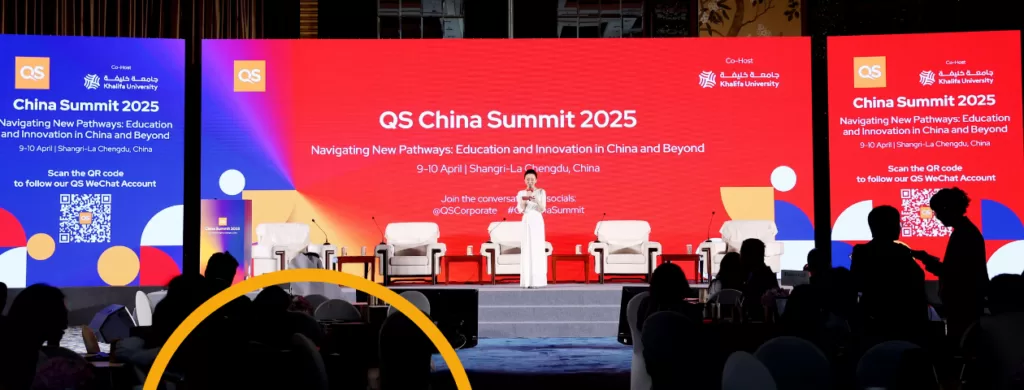
Universities encouraged to be creative in their ambitions for branch campuses in India
The Indian Government’s National Education Plan (NEP) 2020 set out ambitious plans to revolutionise education in India, widening access to quality programmes and a global experience in-country.
Speaking with higher education experts on a QS webinar titled ‘Unlocking Global Opportunities: NEP 2020’s Impact on International Branch Campuses in India’, Joint Minister of Education for the Indian Government, Neeta Prasad, said: “The NEP aims to provide good quality, global education that is reasonably priced and easily accessible, and to prepare students to take advantage of the opportunities arising globally in the years to come, while aspiring to regain our status as the Vishwagurus of education.”
As higher education sectors across the globe wrestle with intensifying competition, rising costs, disruption of new technologies and changing student expectations, India holds in its hands an abundance of opportunities for growth, innovation and the potential to usher in a new model for higher education.
The panel session – chaired by QS Executive Director (AMESA), Dr Ashwin Fernandes – provided insights for universities looking to explore TNE options in India, advising attendees on navigating regulatory landscapes, aligning with NEP 2020 objectives, and understanding market dynamics.
In response to the Indian government’s objective to develop offshore branch campuses of foreign higher education institutions, the University Grants Commission (UGC) has introduced regulations “ to provide an international dimension to higher education in the country which is at par with the best in the world,” Prasad said.
But beyond regulation details and eligibility criteria, panelists from the British Council, Austrade and Education New Zealand shared learnings from their respective country’s progress in exploring branch campuses in India. So, what do universities need to consider?
Is now the right time for your India strategy?
A focal point of many in international higher education, India is on a spectacular ascent and with 43.3 million students enrolled in Indian universities this year, there is an abundance of untapped potential within the higher education market.
Speaking on the panel, Country Director for British Council, Alison Barrett, said: “The TNE initiative in India is an incredibly important shift and game changing in building relationships. It’s very future forward and as education becomes increasingly global and borderless, India is pioneering the way to go.”
After working with the University of Southampton to develop their first branch campus in India, she shared her first learning: “India is a big, very diverse and complex country, so if a university is thinking about setting up here, a thorough and detailed market analysis is needed.
“Think about where potential students reside, how far they might want to travel, the proximity to employers, where demand is and where it might be in the future, affordability of land and infrastructure. There are consultants who can help with this and to help understand the regulatory and commercial environment.”
Engage the right people at the right time
Once a university has established their goal to set up a brand campus in India, understanding when to engage the right people at the right time is crucial to a seamless journey, says Barrett.
“Mapping out a timeline and the protocols involved will help massively. Think carefully about when you need to engage at a central level with government and regulators and when you may need to engage different providers and vendors, when to liaise with advisors and at which stages to get others involved in the process,” she said.
“Have the conversations you need to have to create the clarity that you need to get the internal approvals from your Senate or your councils. Lots of conversations are necessary and I would recommend that you put models on the table and suggest what you’d like to do.”
Start early
With a lot of complexity in the process of setting up a branch campus and multiple factors to consider, “the earlier you start, the better it is,” says Vik Singh, panelist and Trade and Investment Commissioner for Austrade.
“Once you’ve made those decisions, the process with the India government is streamlined, but investing in those decisions before you make an application is where you need to spend more time. Essentially, universities around the world will soon be joining the party.
“There has never been a better time to do business in India, and especially when we look at transnational education. It’s not it’s not a nice-to-have. It’s almost a must have, now.”
Consider your role in reciprocity
Jugnu Roy is Director of Engagement for Education New Zealand. With just eight universities in New Zealand, the country is eager to grow enrollment numbers after re-opening borders after COVID-19 late and facing subsequent challenges. Culturally, New Zealand is focused on reciprocity (or manaakitanga) and giving back, so higher education institutions are looking to understand how more New Zealand students can study in Indian campuses, Roy said.
“Understanding the ecosystem that surrounds these initiatives will be crucial, particularly in identifying how our universities or vocational providers can contribute towards this evolving landscape,” she added.
Find your niche
As more universities look to deliver transnational education provision in India, finding your specialism will be a vital step in the process. According to Barrett, there is a huge growth in subjects like AI and data science, but also in the creative industries. Joint and dual degree programmes are in demand, and, in Australia, psychology is gaining in popularity too.
While the government guidelines for TNE in India are comprehensive, “they are free enough for you to create a model that’s right for you,” said Barrett. “What do you want to build? Explore different options and find out whether it is possible. It’s important that universities take the lead and create the clarity they need through innovative models of education.”
Ensure agreements are workable
To strengthen trust in transnational agreements, written Memorandum of Understandings (MOUs) must evolve into workable exchanges. Roy added: “There are MOUs lying around, but we have to focus on making these into workable TNE agreements where mutual exchange is happening, whether that’s joint research partnerships or dual pathway programmes.
“There is a very strong emphasis in New Zealand to make sure all current articulations and partnerships in existence are in action. I think it’s the best time to be in India, to work with India, and do business with India. The regulatory environment and the policies couldn’t be better.”



